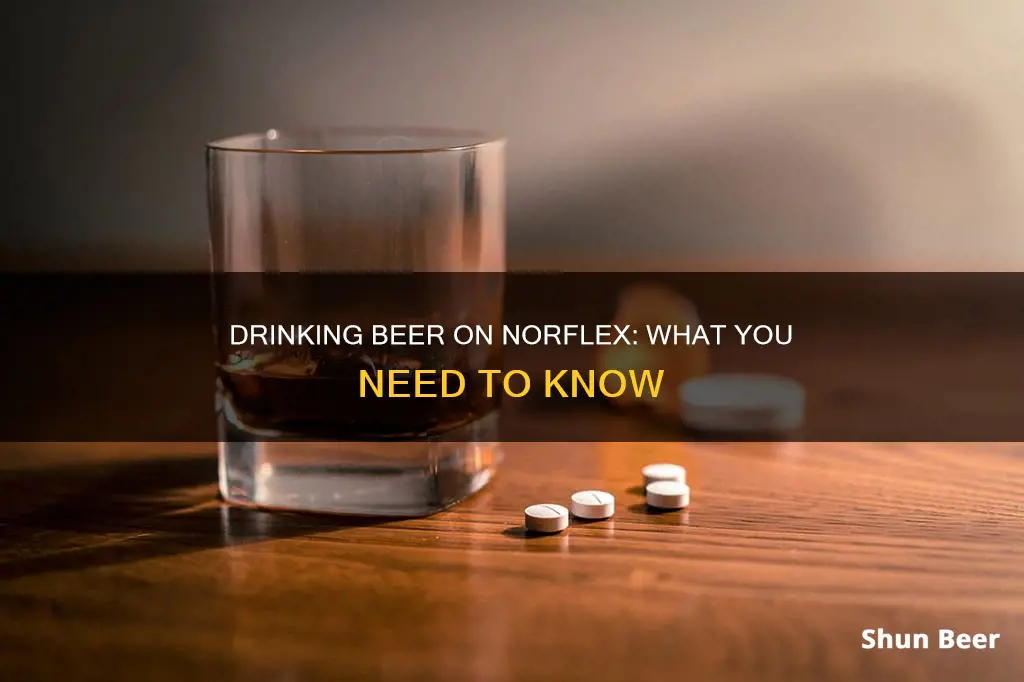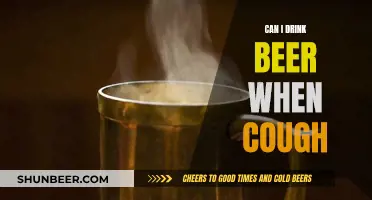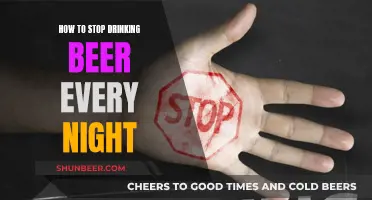
Norflex is a prescription medication used to relieve pain and discomfort caused by muscle spasms, sprains, and other muscle injuries. It is a skeletal muscle relaxant that works by changing the way the body senses muscle pain. While effective, it is not without its side effects, which include drowsiness, weakness, nausea, blurred vision, and dry mouth. It is also not recommended to drink alcohol while taking this medication. This is because alcohol can increase the nervous system side effects of orphenadrine, the active ingredient in Norflex, such as dizziness, drowsiness, and difficulty concentrating. This can lead to impaired thinking and judgment, and even dangerous side effects or death.
| Characteristics | Values |
|---|---|
| Should you drink beer on Norflex? | No |
| Why? | Norflex is a muscle relaxant that depresses the central nervous system. Alcohol is also a central nervous system depressant. Taking both together compounds their impact on the body, intensifying side effects such as drowsiness, dizziness, nausea, impaired coordination, and confusion. |
| What happens if you mix them? | The short-term effects include impaired coordination and motor control, lethargy, confusion, and poor vision. The long-term effects include liver and kidney damage, cognitive function and memory problems, and gastrointestinal damage. Mixing Norflex and alcohol can also lead to overdose, alcohol poisoning, and even death. |
| What to do if you've already mixed them? | Stop drinking immediately. Seek medical attention, especially if you've had more than one drink or don't drink often. |
What You'll Learn

The dangers of mixing muscle relaxers and alcohol
Mixing muscle relaxers and alcohol can be extremely dangerous and even lethal. Both substances are central nervous system depressants, which means they slow down activity in the brain and nervous system. When combined, they can cause harmful and potentially fatal effects on the body.
Short-term effects
Mixing muscle relaxers and alcohol can lead to short-term effects such as:
- Increased drowsiness or tiredness
- Dizziness or light-headedness
- Poor coordination and motor control
- Memory problems
- Increased risk of seizures
- Increased risk of overdose
- Impaired judgment and aggressive behaviour
- Poor vision and confusion
Long-term effects
The long-term effects of mixing muscle relaxers and alcohol can be even more concerning and include:
- Liver damage: Both substances are processed by the liver, and when combined, it has to work harder, leading to potential damage.
- Addiction: Prolonged use of either substance can lead to physical dependence and addiction.
- Alcohol poisoning: Muscle relaxers can enhance the effects of alcohol, increasing the risk of alcohol poisoning.
- Gastrointestinal damage: Alcohol and prescription medications can cause inflammation and scarring in the GI tract, leading to issues such as ulcers, hemorrhoids, constipation, or diarrhea.
- Kidney damage: The build-up of toxins due to liver and kidney damage can result in fatigue, jaundice, and toxin retention.
What to do if you've mixed muscle relaxers and alcohol
If you or someone you know has mixed muscle relaxers and alcohol, it is important to take the following steps:
- Seek medical help immediately by calling emergency services or going to the nearest hospital.
- Provide medical professionals with honest information about the substances consumed and their quantities.
- Monitor vital signs such as breathing, pulse, and consciousness while waiting for medical assistance.
- Do not leave the affected individual alone and place them in the recovery position if they lose consciousness to prevent choking.
- Avoid further consumption of alcohol or muscle relaxers.
- Follow the advice of healthcare professionals and administer treatments as instructed.
Why people mix muscle relaxers and alcohol
There are various reasons why individuals may mix muscle relaxers and alcohol:
- To counter side effects: Some may believe that alcohol will provide relief from the side effects of muscle relaxers, such as nausea or headaches.
- Unintentional mixing: Some may be unaware of the potential drug interaction or that alcohol is still in their system after taking a muscle relaxer.
- Self-medication: The combination can induce feelings of intense relaxation and euphoria, leading to self-medication or the pursuit of a "high".
Precautions
To avoid the dangers of mixing muscle relaxers and alcohol, it is crucial to take the following precautions:
- Consult your doctor or pharmacist before combining alcohol with any medication, including muscle relaxers.
- Understand the potential side effects and interactions of any prescription medication you are taking.
- Wait until the effects of muscle relaxers have completely worn off before consuming alcohol.
- Avoid mixing muscle relaxers with other central nervous system depressants, such as opioids or benzodiazepines.
Beer and Painkillers: Mixing Tylenol and Alcohol
You may want to see also

Why you should never mix Norflex and alcohol
Norflex is a prescription medication used to relax muscles and relieve pain and discomfort caused by muscle injuries, strains, and sprains. It is a skeletal muscle relaxant that works by changing the way the body senses muscle pain.
While Norflex can be an effective treatment for muscle pain, it is important to be aware of its potential side effects and interactions with other substances, such as alcohol. Here are several reasons why you should never mix Norflex and alcohol:
Intensified Side Effects
Norflex can cause side effects such as drowsiness, dizziness, fatigue, blurred vision, nausea, and a quickened heart rate. When combined with alcohol, these side effects can become more intense and dangerous. Alcohol is a central nervous system depressant, and it slows down activity in the brain and nervous system. Both Norflex and alcohol have sedative effects and share common side effects, which are amplified when the two substances are mixed. This can lead to increased drowsiness, dizziness, impaired coordination, memory problems, and an increased risk of seizures and overdose.
Impaired Judgment and Increased Risk of Accidents
The combination of Norflex and alcohol can impair cognitive and motor functions, affecting your ability to think clearly, make decisions, and perform tasks requiring alertness and coordination. This can increase the risk of accidents, such as falls, car crashes, and injuries. It is important to avoid driving or operating heavy machinery when taking Norflex, and the risks are even higher when mixed with alcohol.
Serious Health Risks
Mixing Norflex and alcohol can lead to serious short-term and long-term health problems. In the short term, individuals may experience respiratory depression, confusion, poor motor control, and abnormal heartbeat. Long-term use of this combination can result in liver and kidney damage, cognitive function problems, memory issues, and gastrointestinal damage. The risk of overdose and alcohol poisoning is also significantly increased, which can be life-threatening.
Potential for Addiction
Both Norflex and alcohol have the potential to be habit-forming and addictive. When combined, they act on the brain's reward center, producing pleasurable effects. This can lead to physical dependence and poly-drug addiction, making it extremely difficult to quit without professional help.
Dangerous Interactions with Other Substances
Norflex may also interact with other substances, such as opioid pain medications, benzodiazepines, antidepressants, and herbal supplements. Alcohol can further increase the effects of these interactions, leading to unpredictable and harmful consequences. It is crucial to consult your doctor or pharmacist about all the medications and supplements you are taking to avoid dangerous interactions.
In conclusion, mixing Norflex and alcohol can lead to intensified side effects, impaired judgment, serious health risks, potential for addiction, and dangerous interactions with other substances. It is crucial to follow your doctor's instructions and avoid consuming alcohol while taking Norflex to ensure your safety and well-being.
Beer and Hyoscyamine: A Safe Mix?
You may want to see also

The side effects of mixing Norflex and alcohol
Norflex is a prescription medication used to relieve pain and discomfort caused by muscle injuries. It is a skeletal muscle relaxant that works by changing the way the body senses muscle pain.
Mixing alcohol with muscle relaxants is dangerous and can even be lethal. Both alcohol and muscle relaxants like Norflex are central nervous system depressants, which means they slow down brain activity and functions like breathing and heart rate. They can also cause feelings of calmness or sleepiness.
When mixed, the effects of both substances are intensified, leading to dangerous side effects. These include:
- Increased drowsiness or tiredness
- Dizziness or light-headedness
- Reduced motor control or coordination
- Problems with memory
- Increased risk of seizures
- Increased risk of overdose
- Slowed or difficulty breathing
- Impaired judgment and poor decision-making skills
- Poor vision
- Confusion
- Increased risk of falls, accidents, and injuries
- Liver and kidney damage
- Addiction
- Alcohol poisoning
- Gastrointestinal damage
If you or someone you know has mixed Norflex and alcohol, it is important to seek medical help immediately, especially if you notice any of the following symptoms:
- Feeling extremely tired
- Severely impaired movement or coordination
- Heartbeat abnormalities
It is also important to be cautious and informed before consuming alcohol with any prescription medication. Always ask your doctor or pharmacist if you have any doubts or concerns.
Beer and Fatty Liver: Is There a Link?
You may want to see also

What to do if you've mixed Norflex and alcohol
Mixing alcohol and muscle relaxers can have serious health consequences, and it is not recommended to mix the two. If you or someone you know has mixed alcohol and Norflex, a prescription muscle relaxant, here is what you should do:
Seek Medical Help
Call emergency services or take the person to the nearest hospital. Do not wait for symptoms to appear as a precautionary measure.
Provide Information
Be honest with medical professionals about the substances consumed and the quantities. This information will help healthcare professionals provide the best treatment.
Monitor Vital Signs
Keep an eye on the person's breathing, pulse, and consciousness while waiting for medical assistance. If they lose consciousness or their breathing becomes shallow or irregular, perform CPR if you are trained to do so.
Do Not Leave Them Alone
Stay with the person until medical help arrives. If they become unconscious, place them in the recovery position to prevent choking in case of vomiting.
Avoid Further Intake
Do not allow the person to consume any more alcohol or muscle relaxants.
Follow Medical Advice
Once medical professionals arrive, follow their instructions. They may administer treatments such as activated charcoal or intravenous fluids to stabilise the person's condition.
Prevent Future Incidents
After the incident, have an open conversation about the dangers of mixing alcohol and muscle relaxants. Encourage the person to seek help if they are struggling with substance use.
Fireball and Beer: A Safe Mix?
You may want to see also

How to avoid harmful drug interactions
Mixing alcohol with muscle relaxants such as Norflex can be dangerous and even lethal. Both alcohol and muscle relaxants are central nervous system depressants, which slow down brain activity and can affect your breathing and heart rate. They can also cause drowsiness and dizziness. When combined, these side effects become more pronounced, and there is an increased risk of overdose and alcohol poisoning.
- Communicate with your healthcare providers: Tell your pharmacist or doctor about all the medications you are taking, including prescription drugs, over-the-counter drugs, herbal supplements, and vitamins. Be transparent about your alcohol consumption and any illegal drug use.
- Understand your medicines: Educate yourself about your medications and their potential interactions. Use reliable online tools and consult with your pharmacist to understand the mechanism and significance of drug interactions.
- Use one pharmacy: Filling all your prescriptions at the same pharmacy helps keep a complete record of your medications. This enables your pharmacist to run a drug interaction screen and identify any potential issues.
- Be cautious with food and beverage interactions: Certain foods and drinks can affect how your body processes medications. For example, grapefruit juice can alter blood levels of some drugs, and vitamin K-rich foods can interact with blood thinners. Always inform your doctor or pharmacist about your diet.
- Avoid risky websites: Do not buy medicines from unverified online sources. The safety and effectiveness of imported drugs cannot be guaranteed, and you may receive expired or incorrect medications.
- Follow dosing recommendations: Adhere to the instructions on your prescription bottle, including spacing out the timing of your doses to avoid certain interactions. Do not change your dosage without consulting your doctor.
- Disclose your medical history: Inform your healthcare providers about any medical conditions or health problems you have. This helps them identify potential drug-condition interactions and prescribe suitable medications.
Drinking and Driving: How Many Beers Are Too Many?
You may want to see also
Frequently asked questions
No, you should not drink beer or any other alcoholic beverage while taking Norflex. Alcohol can increase the nervous system side effects of orphenadrine, the active ingredient in Norflex, such as dizziness, drowsiness, and difficulty concentrating.
The side effects of drinking alcohol while taking Norflex can include increased dizziness, drowsiness, difficulty concentrating, impaired thinking, and poor judgment. More seriously, dangerous side effects or even death can occur.
If you have already mixed alcohol and Norflex, you should stop drinking immediately and seek medical attention as soon as possible, especially if you have had more than one drink or do not drink often.
Both alcohol and Norflex are central nervous system depressants, meaning they slow down activity in the brain and nervous system. When combined, they can compound their impact on your body, intensifying side effects such as drowsiness and dizziness, and leading to serious health problems such as respiratory depression and even death.
In addition to alcohol, you should avoid taking opioid drugs, benzodiazepines, tricyclic antidepressants, monoamine oxidase inhibitors, and certain antibiotics while taking Norflex, as they can react with the medication.







